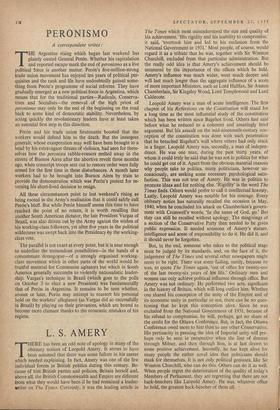L. S. AMERY
THERE has been an odd note of apology in many of the obituary notices of Leopold Amery. It seems to have been assumed that there was some failure in his career which needed explaining. In fact, Amery was one of the few individual forces in British politics during this century. Be- cause of him British parties and policies, Britain herself and, above all, the British Commonwealth and Empire are different from what they would have been if he had remained a leader- writer on The Times. Curiously, it was the leading article in The Times which most misunderstood the size and quality of his achievement. 'His rigidity and his inability to compromise,' it said, 'overtook him and led to his exclusion from the National Government in 1931.' Most people, of course, would regard it as a tribute that he was, together with Sir Winston Churchill, excluded from that particular administration. But the really odd idea is that Amery's achievement should be measured by the importance of the offices which he held. Amery's influence was much wider, went much deeper and will last much longer than the aggregate influence of a score of more important Ministers, such as Lord Halifax, Sir Austen Chamberlain, Sir Kingsley Wood, Lord Templewood and Lord Caldecote.
Leopold Amery was a man of acute intelligence. The first chapter of his Reflections on the Constitution will stand for a long time as the most influential study of the constitution which has been written since Bagehot lived. Others had said before what he reduced to a coherent and amazingly brief argument. But his assault on the mid-nineteenth-century con- ception of the constitution was done with such penetration that he breached Bagehot's wall where others had only stuck in a finger. Leopold Amery was, secondly, a man of indepen- dence. He was one man, during the past thirty years, of whom it could truly be said that he was not in politics for what he could get out of it. Apart from the obvious material reasons why people take to politics, many politicians, however un- consciously, are seeking some necessary psychological satis- faction. This was not true of Amery. He was in politics to promote ideas and for nothing else. 'Rigidity' is the word The Times finds. Others would prefer to call it intellectual honesty. Lastly, Leopold Amery was notable for his courage. Every obituary notice has naturally recalled the occasion in May, 1940, when he concluded his attack on Chamberlain's govern- ment with Cromwell's words, 'In the name of God, go.' But they can still be recalled without apology. The misgivings of a section of the Conservative Party then needed to be given public expression. It needed someone of Amery's stature. intelligence and sense of responsibility to do it. He did it, and it should never be forgotten.
But, in the end, someone who takes to the political stage must be judged by its standards, and, on the face of it, the judgement of The Times and several other newspapers might seem to be right. There was some failing, surely, because he was, to quote The Times again. 'out of office for twenty-one of the last twenty-six years of his life.' Ordinary men and women can only achieve political influence through office. But Amery was not ordinary. He performed two acts, significant in the history of Britain, which will long outlive him. Whether one shared his conception of the unity of the Empire and of its economic unity in particular or not, there can' be no ques- tioning that he kept this conception alive. Since he was excluded from the National Government of 1931. because of his refusal to compromise, he will, perhaps, get no share of the credit for the Ottawa Conference. But, in fact, the Ottawa Conference owed more to him than to any other Conservative. His pertinacity in pressing the idea of Imperial unity will per- haps only be seen in perspective when the line of descent through Milner, and then, through him, is at last drawn to some positive achievement. Secondly, he has kept alive for many people the rather novel idea that politicians should think for themselves. It is not only political geniuses, like Sir Winston Churchill, who can do this. Others can do it as well. When people regret the deterioration of the quality of today's Members of Parliament, they are regretting that there are not back-benchers like Leopold Amery. He was, whatever office he held, the greatest back-bencher of them all.
































 Previous page
Previous page